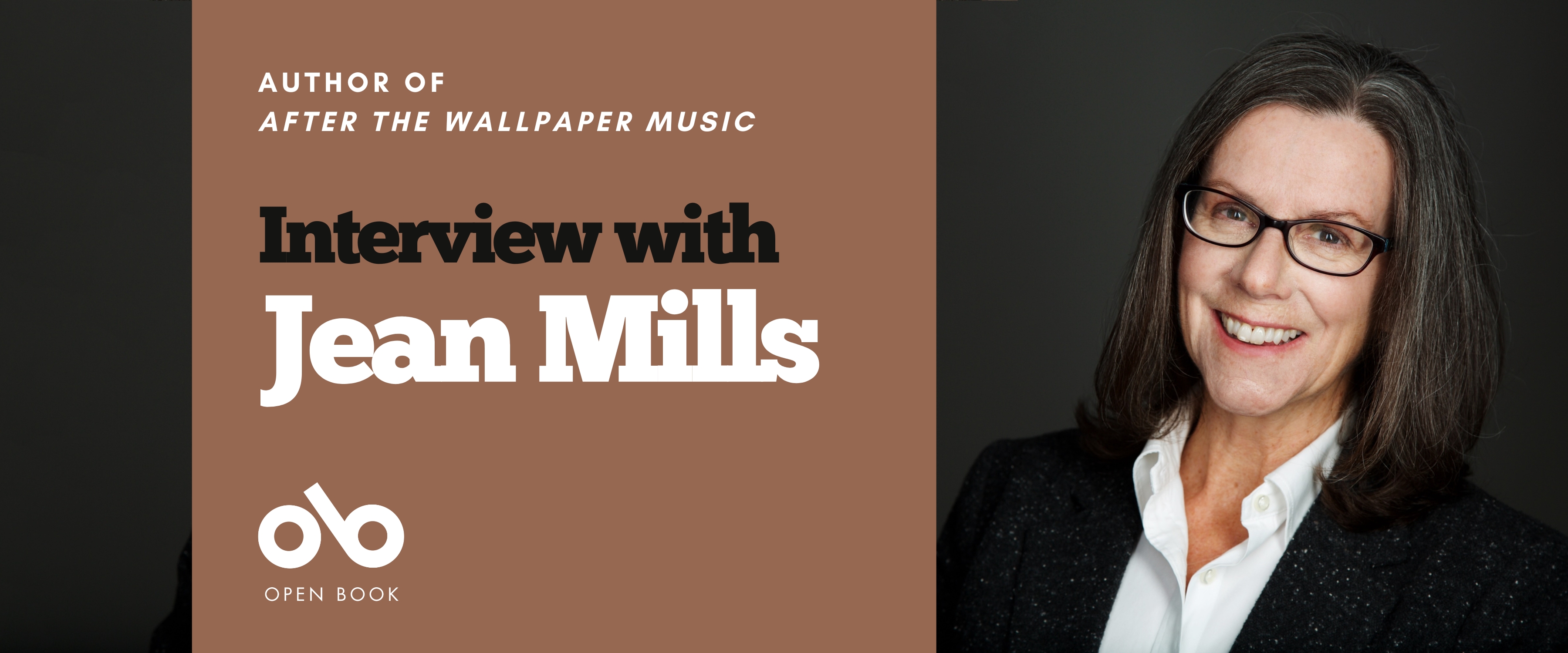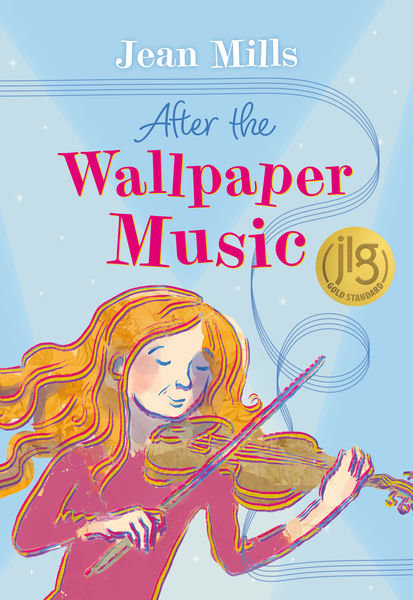Music and Friendship are at the Heart of an Uplifting Middle Grade Novel from Jean Mills
Along with being a prize-winning author, Jean Mills is also a musician and music lover who has found a wonderful way to tie that passion into her latest middle-grade novel.
This new book, After the Wallpaper Music (Pajama Press), follows twelve-year-old Flora, a violinist who plays classical music and traditional Newfoundland fiddle tunes for her elderly aunt. Music is her life, and she's happy to stay in her comfort zone until a Battle of the Bands is announced and some of her friends want to enter. But, things take a turn when they decide they want to play something new.
Flora also encounters a talented drummer named Simon, who has suffered a recent loss and is having a difficult time, and he invites the young violinist to step out even further and play rock riffs in his band. Faced with evolving friendships and feeling the pull to take new musical risks, Flora finds herself at a pivotal time as a young person.
It's a story told by an author with a clear love for musicality, and the joys of music and friendship are on full display in the work.
Read more about this uplifting and inspiring new book in our Kid's Club BFYP interview with the author, fresh off the press at Open Book!
Open Book:
Tell us about your new book and how it came to be.
Jean Mills:
After the Wallpaper Music is the story of 12-year-old Flora Parsons, whose violin-playing takes her in three different directions: she plays first violin in a string quartet with three close friends; she plays traditional Newfoundland fiddle tunes for her elderly Auntie Flora, who lives with her family; and she’s invited to play rock riffs in a band started by a grieving new boy at school. A Battle of the Bands competition complicates everything. The story actually started as a Young Adult pitch for a Hi-Lo publishing program, but something about Flora just called me to dial it back to Middle Grade. Perhaps my own memories as a musical kid? Having an opportunity to showcase my love for Newfoundland traditional tunes was also an inspiration.
OB:
Is there a message you hope kids might take away from reading your book?
JM:
“Message” – no. I never think about delivering a message when I’m writing. In this story there are young characters who navigate their friendships (loyalty, disagreements), who face family struggles (illness, loss), and who find joy and healing in their music (yay for the arts!). I just want to tell a story, and if any of it resonates with kids, and gives them something to think about and draw on in their own lives, I’m happy.
Your CanLit News
Subscribe to Open Book’s newsletter to get local book events, literary content, writing tips, and more in your inbox
OB:
Is there a character in your book that you relate to? If so, in what ways are you similar to your character and in what ways are you different?
JM:
Flora is very close to my adolescent self, and I was inspired by that connection as I wrote her story. I, too, was a musical kid, playing recorder in an Early Music ensemble, playing viola in a string quartet, teaching myself guitar, writing my own songs. Flora and I don’t like confrontation, either. She’s way more confident that I was at that age, however. Embracing the rock band opportunity, and her problem-solving during the Battle of the Bands competition – no, that wouldn’t have been me at age 12!
OB:
What was the strangest or most memorable moment or experience during the writing process for you?
JM:
I wanted to include a sentimental traditional Newfoundland/Irish song called “Sweet Forget-Me-Not” that plays an important role in Flora’s relationship with her Auntie Flora, but the editor at Pajama Press was concerned about using a recognizable song in the book and suggested I write one, instead. So I did! I kept it very simple and trad-sounding so that young readers could easily learn it themselves. I wrote it out and sent it in – and they used my musical notation in the book. That page showing “Time is a Fickle Friend” is actually my handwritten tablature. I was tickled!
OB:
Do you feel like there are any misconceptions about writing for young people? What do you wish people knew about what you do?
JM:
Where do I start? And thank you for asking this question. I am constantly frustrated by the misconceptions that surround writing for young people. That it’s “easier” to write and to read. That it’s lightweight, not literary. That it’s all edgy and angsty or simply genre fiction. That anyone could do it, “if I had the time…”
I once heard an award-winning YA author say, on CBC Radio: “It's not your typical YA novel. It's hefty and significant.” Which means that ‘typical’ YA writing has no heft or significance?
Okay, I understand that publishers and booksellers have to find a shelf for the books they produce, promote, and sell.
But, as a writer, when I am consumed by a character’s voice and delve deeply into the interaction between characters, and dig out words to tell this story, I don’t think to myself, “I want to write a Young Adult story that will be published and reviewed as a Young Adult novel and sold in the Young Adult section of the bookstore and shelved in the Young Adult department of the library and is intended for Young Adults to read…”
All I’m doing is telling a story that will appeal to any reader (I hope) no matter their age. And, yes, adults read stories about kids, too. Why was THE MARROW THIEVES on the bestseller list for over five years? Why do I regularly receive heartfelt responses to my novels from adult readers? Once upon a time, adults were kids and teens, too, and these stories resonate.
Of course, readers – and their gatekeepers, in the case of the youngest – have to consider subject matter, language level, themes, narrative, but the age of the main character shouldn’t be the deciding factor in whether to lift a book off the shelf and crack it open. I defy any adult to read something like Heather Smith’s BARRY SQUIRES, FULL TILT and not be changed by it.
My philosophy is that a good story is a good story, no matter the age of the main character. I try to write good stories, and I’ve had young and not-so-young readers, award committees, teachers, librarians, and reviewers tell me I’m doing okay. So, I ask all readers and gatekeepers to please drop this literary prejudice against kidlit. It is not easy to write. And you will find gold there, if you give it a chance.
OB:
How would you describe the writing community in Canada in terms of authors writing for young people? What strengths and weaknesses do you observe within the community?
JM:
I consider myself very much under the radar when it comes to the community of authors writing for young people, so my observations might be different from someone’s like Eric Walters, or Cherie Dimaline, or Kenneth Oppel or so many others whose books appear on the award lists and in literary journals and at festivals. But what I have noticed throughout my career so far is that no matter how much attention and “celebrity” some of our high-profile authors receive, there is an underlying collegial, supportive, positive vibe that runs through our interactions. Kidlit authors raise up other authors in Canada. Sometimes its vocal and prominent on social media, sometimes it’s just an email saying, “I just read your book, and I loved it.” Organizations like CANSCAIP (Canadian Society for Children’s Authors, Illustrators and Performers) help. So do bookstores (yay for those independent booksellers!), teachers and librarians. A rising tide raises all ships, and I believe that’s a philosophy the Canadian KidLit community embraces.
OB:
What are you working on now?
JM:
I’m currently finishing edits on a YA Hi-Lo novel for Orca Books (BUSTED, Winter 2026) about a boys’ hockey team navigating the dark side of hockey culture, thanks to a video recorded in the team’s change room by accident. And I have two works in progress. One is a Middle Grade novel (THE SUPERPOWER OF LEXI D) about a girl whose superpower is her talent with words. She has to advocate for herself when she’s accused of cheating in a public speaking contest, and along the way she also uses her ‘superpower’ to stand up for a boy with a sensitivity to sounds (misophonia). My other WIP is a YA novel in verse (WICKED STEPMOTHER BLUES) about a teen dealing with her musical dreams, a couple of very different boys, and her own troubled mental health during a summer spent with her father and stepmother, where she discovers that people aren’t always what they seem at first, and that she has the power to make herself happy.
___________________________________________
Jean Mills has been writing professionally for over 30 years, her five Young Adult novels received critical acclaim in Canada and internationally. Skating Over Thin Ice was a 2019 Forest of Reading Red Maple Fiction nominee and was named to the USBBY Outstanding International Book List. Jean is a former college Communications professor, and she also spent ten years on the Media & Communications team at Curling Canada. When she’s not writing, she can be found playing one of her many musical instruments, creating something with yarn, or cheering for the Maple Leafs. Jean lives in Guelph, Ontario.







